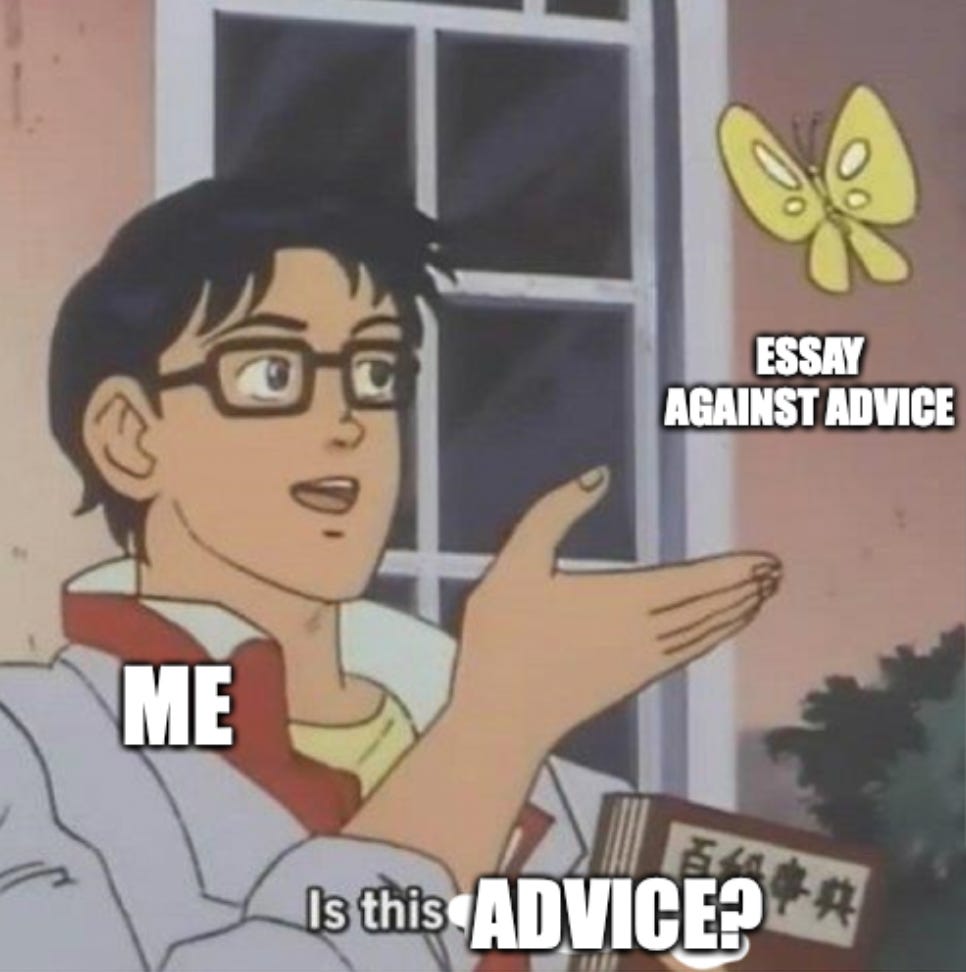Against Advice
Against all odds, I often find myself in the position of being asked to give advice. I always play along, even though I’m pretty sure I’m just participating in a charade. What advice do you have for a young person at the start of their career? For a future entrepreneur? For a budding writer? The questions are all interchangeable, the answers even more so. The truth is, all advice is useless.
I’m talking here about the sort of generic, distributed-at-scale advice you might find in an essay or at a public Q&A. I don’t think it’s useless when someone who knows you and your situation well gives you their specific, individualized take (though even then I’d argue it’s the act of talking through things, and of being listened to, that has the impact, not the actual advice itself). But platitudes tossed off to the public at large? Those, you’re probably not going to get much out of.
First there’s the fact that most successful people have no idea what made them successful. (For that matter, neither do most unsuccessful people know what kept them from being successful, unless it was something obvious like sleeping with their boss’ wife.) Asked to explain their success, the best acknowledge the role of luck and mystery; most, grasping at straws, fall back on clichés like “persistence,” or point to the most insufficient details of their daily routines in ways they must know won’t stand up to even a moment’s scrutiny. John D. Rockefeller simply thought he’d been chosen by God, which is as good an explanation as any I’ve ever heard.
Next there’s the matter that even if you could somehow isolate exactly what it was that made you successful, there’s no guarantee it would work for anyone else. (It’s for this reason that I’ve long wanted to write an article called “How to Get Into Y Combinator, in 2016, If You’re Me.”) In fact, the more successful you are, the less likely it becomes that your path is still relevant, as the largest successes are found by blazing new trails.
But even beyond that, the factors that make up our individual drives and motivations are too personal to replicate. Almost every U.S. President has had serious issues in their relationship with their father. But what are you supposed to do if you hear this and want to be President—go muck things up with your own father?
You might think these points are obvious. I actually think they’re fairly obvious too—which is why I suspect that most of the participants in our modern rituals of advice-giving aren’t really seeking to give or receive advice. Perhaps when a young writer asks an older one for their tips, they’re not really seeking anything other than to make themselves seen. Perhaps the advice-giver dispenses platitudes they know are useless out of a subconscious fear of acknowledging the inherent unknowable-ness of their success.
Even I myself am guilty. What is an exhortation not to listen to advice other than… its own form of advice? I can dress it up as much as I want, but ultimately here I am, advising against the very thing I’m delivering.
I’m reminded of a question I’m occasionally asked in interviews, or at especially annoying dinner parties: “What advice would you give to the younger version of yourself?”
My answer is always the same. It doesn’t matter what advice I’d give, because the younger version of me wouldn’t listen anyway.
Yours in assuring the one or two people reading this who recently asked me for advice that this isn’t specifically directed at them,
Max


